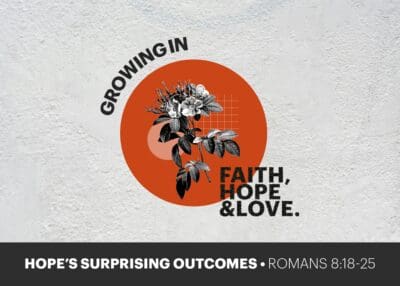Remember, O Lord, what has befallen us; look, and see our disgrace. (Lamentations 5:1)
The words ‘us’ and ‘our’ and ‘we’ are all over this chapter. Here, for the first time in the book of Lamentations, the grieving people begin to speak.
These people have been shocked, stunned, and numbed by the terrible events that have taken place in their lives. They can hardly take in what has happened to them and they sit in silence for the first four chapters. It is not easy to pray when something so devastating has come into your life.
I have referred throughout this series to the experience of friends from our church with whom Karen and I met at the end of last year. All of them had experienced the loss of a child, a sibling, a spouse or a father.
When we talked about prayer, one person in the group said, “I felt a real distance from God especially at first. I felt so low and so far from God.” Another said, “I couldn’t pray. I just read the Psalms over and over again.” That was very wise. Another said, “I prayed for years, but after this happened I began to wonder if God really hears me.”
Describing his own journey through grief, C. S. Lewis writes: “Meanwhile where is God? …Go to Him when your need is desperate, when all other help is vain, and what do you find? A door slammed in your face, and a sound of bolting and double bolting on the inside. After that, silence.” [1] There can’t be a Christian who doesn’t know what this experience is like.
Lamentations describes that experience exactly: “You have wrapped yourself with a cloud so that no prayer can pass through” (Lam. 3:44). This was the experience of these people. They were so shocked and stunned by what happened to them that they were unable to speak for themselves, and unable to pray for themselves. For the first four chapters, they have been sitting in silence. They don’t speak a word until chapter 5.
That raises the obvious question: Who has been speaking in the first four chapters of this book? The book of Lamentations was written under the inspiration of the Holy Spirit by Jeremiah, so clearly, these are his words, spoken as he was moved by the Spirit. But the words of Lamentations go beyond what Jeremiah could fulfill.
Scholars debate how many ‘voices’ there are in the book of Lamentations. Lamentations is like a great drama with different voices – the voice of the city, the voice of the prophet, and now the voice of the people. But there is only one voice that ultimately matters.
For the first four chapters, the people have been sitting in silence. Someone has been speaking for them. Someone has been speaking to them. I’m going to call this person the Counselor.
What happens in this remarkable book is that a counselor comes alongside these grieving people and ministers to them in their sorrow and loss. Who is the Counselor? This person is never named. But the ministry that this person exercises is a model of what we would call ‘counseling’ at its very best.
I want to introduce you to this wonderful counselor today. I want to tell you about his ministry, and invite you to seek his help.
What the Counselor Does
1. The Counselor sheds tears with the people.
How lonely sits the city that once was full of people! (Lamentations 1:1)
Lamentations begins with a description. There is no ‘we,’ ‘our,’ or ‘us’ here. The people don’t have any words. They sit in the silence of their suffering.
Picture someone sitting with their head in their hands, looking out over the ruined city, and someone comes and sits down beside them and says, “How lonely sits the city that once was full of people!” (1:1).
This Counselor speaks for the people. He is not a detached observer. He is in the grief with the people. He sits beside the people and he weeps with those who weep. The Counselor shares the suffering of these people – their city is his city, their loss is his loss, and their sorrow is really his sorrow.
So verse by verse, line by line, the Counselor, holds up the shattered pieces of the broken lives of the people with whom he sits and weeps, and he is putting into words what the people cannot express for themselves.
Picture yourself sitting with a counselor who is helping you, supporting you, and guiding you through grief and loss. This counselor does not sit behind a desk. He sits beside you in your sorrow.
He weeps with you. And when he speaks, he seems to express exactly what you are thinking and feeling, so that you are completely amazed. “How did you know so fully, so completely? That is exactly where I am, but I could never have put it into words like that myself.”
You may have said, “If only there was someone who could feel what I’ve felt, but no one could ever know the extent of my grief and sorrow. No one could ever plumb the depths of my mind or my heart.”
But what if there was a counselor who was in the grief with you? What if there was a counselor who feels all that you have felt, who saw all that you have seen, and who knew all that you have done? What if there was a counselor who knew you completely and all that you have ever experienced?
You may say, “That is impossible! Nobody can ever fully know my mind, my heart, and all that has happened in my life.” But that is exactly what we have here.
This counselor is not named in Lamentations. But what this book is telling us is that when the people of God were at a place so dark and so desperate that they could not speak for themselves, someone came and wept with them, and he spoke for them as one who knew their suffering from the inside.
There may be times in your life where you are convinced that nobody could ever know what you feel. Nobody could ever understand the depth of your anguish. Remember the Counselor, who shed tears with the people.
Surely all of this points us forward to our Lord Jesus Christ, our Wonderful Counselor, who comes alongside his people by his Holy Spirit. Our Lord refers to the Holy Spirit as “another Counselor” [2] (John 14:16), meaning that Christ himself is our counselor, and that his counseling ministry is exercised in our lives by sending the Holy Spirit to live in us.
When you become a Christian, God’s Spirit dwells in you. He is present with you in all that you experience. He knows everything you have ever felt and thought, in all of its depth and complexity. The Spirit knows it from the inside, because he dwells in you.
When you come to the place of thinking that no one could ever understand what you’ve experienced, remember the great Counselor.
2. The Counselor speaks truth to the people.
I am the man who has seen affliction… (Lamentations 3:1)
If you turn now to Lamentations 3, you will see that there is a very striking change. The Counselor who has been speaking for the people now speaks to the people, and he says, “I am the man who has seen affliction…” (Lam. 1:1).
The Counselor has been speaking about you. He seems to know and understand you completely. He describes all that has happened to you, as if he lived in your skin. But now he begins to speak about himself. A relationship has been established, and he wants you to know him as he already knows you.
Picture this counselor – he has been sitting beside you, walking through all that has happened to you, laying out all that you have thought, putting into words all that you have felt. In this process, you have become profoundly aware that he knows you completely.
Now he gets up from where he has been sitting beside you. He pulls up a chair and sits down opposite you, and looking deeply into your eyes, he begins to speak to you about himself.
Now there are other places in Lamentations where the Counselor speaks in the first person, though earlier he seems to be speaking for the people rather than for himself. But here, the Counselor speaks of his own experience.
Notice, he introduces himself as the Man: “I am the Man who has seen affliction.”
- He suffers under the rod of God’s wrath (3:1)
- He is driven into darkness without any light (3:2)
- He calls and cries out for help but God shuts out his prayer (3:8)
- He feels that his endurance and hope are gone (3:18).
But then, having described the depth of his own suffering, the Man tells us about his hope.
- But this I call to mind, and therefore I have hope: The steadfast love of the Lord never ceases; his mercies never come to an end (3:21-22).
The Counselor moves between these two ministries of speaking for the people and speaking to the people throughout the book.
Some words in this book could only be spoken by the people. There the Counselor is speaking for the people. Some words could only be spoken by the Counselor, and there the Counselor is speaking to the people. And sometimes the lines are blurred and what is said may be the shared experience of the Counselor and the people together.
This ministry of the Counselor continues for four chapters. In all this time, the people have not spoken a single word. All they are able to do is to receive from the Counselor who speaks for them and speaks to them. But when we come to chapter 5, the people finally speak for themselves. [3]
The Fruit of the Counselor’s Ministry
1. The Counselor brings people to pray.
“Remember, O Lord, what has befallen us.” (Lamentations 5:1)
Here is the fruit of the Counselor’s ministry: He brings them from a place where they are unable to speak (2:10), to a place where for the very first time since the trauma they have suffered that they are able to speak to God for themselves. The Counselor brings them to a place where they can pray
As you would expect, the prayer comes out of tremendous agony and pain. That reminds us of something important – you don’t have to be in a composed frame of mind, filled with a wonderful sense of peace before you can pray. If you have to have it all sorted out before you can pray, most of us are never going to get there.
When Hanna prayed, she was deeply distressed and wept bitterly (1 Sam. 1:10). When Jesus prayed in the Garden of Gethsemane, his soul was overwhelmed with sorrow. You don’t have to be calm, confident, and clear-minded before you can pray. You come as you are to God. You come, not because you have, but in order to receive. There’s more.
2. The Counselor establishes people in faith.
But you, O LORD, reign forever; your throne endures to all generations. (Lamentations 5:18-19)
Through the ministry of the Counselor, the people finally get to the place where they are able to pray. They lay their sorrow before the Lord. The sum of it is found in verses 17 and 18: “For this our heart has become sick, for these things our eyes have grown dim, for Mount Zion which lies desolate. But…” What is the ‘but’ for? “But you, O Lord, reign forever; your throne endures to all generations” (3:19).
This is like Ephesians 2 where Paul lays out the full extent of the human problem: “You were dead in… trespasses and sins” (Eph. 2:1). “But God, being rich in mercy… made us alive together with Christ” (Eph. 2:4, 5).
They are looking at the ruined city, but the Wonderful Counselor has brought them to the place where they can see that God doesn’t depend on a city. He has brought them to a place of faith: “You, O Lord, reign forever: your throne endures to all generations.”
An unnamed soldier who experienced the horrors of the trenches in the First World War wrote these words:
They cannot shell his temple, nor dynamite his throne
they cannot bomb his city, nor rob him of his own.
They cannot take him captive, or strike him deaf or blind
nor starve him to surrender, nor make him change his mind.
They cannot cause him panic, nor cut of his supplies
they cannot take his kingdom, nor hurt him with their lies.
Though all the world be shattered, his truth remains the same
his righteous laws still potent and Father still His name.
Though we face war and hunger and feel their goad and rod
we know above confusion there always will be God. [4]
3. The Counselor restores people to hope.
Restore us to yourself, O LORD, that we may be restored! (Lamentations 5:21)
God is wonderfully honored here in this expression of hope: “Lord, restore us to yourself! Lord, if we have you, we know we can face anything. Whatever happens, there is hope for us, so long as we have you!” That honors God wonderfully.
There is a Wonderful Counselor who can bring you to a place where you can pray. He can establish you in faith. He can restore your hope.
There’s something else here that is also important: Because of the Counselor these people have faith, hope, and prayer, but they still have questions.
An Alternate Ending?
Renew our days as of old – unless you have utterly rejected us, and you remain exceedingly angry with us. (Lamentations 5:21-22)
When you first read this, you may feel that Lamentations would have a better ending if it stopped at verse 21: “Restore us to yourself, O Lord, and we will be restored!” Isn’t that the perfect ending? Why spoil it by adding verse 22?
God makes no mistakes, and verse 22 is exactly the right ending for two reasons.
i. Grief is never neat and tidy.
People who pray, people who are established in faith, and people who are renewed in hope still have questions. We walk by faith, not by sight. One day faith will be turned to sight, but today is not that day. So until that day, we will have questions. The last verse of Lamentations guards against premature closure.
- S. Lewis comments on how people often speak about “getting over it,” sometimes with little understanding of the ongoing effects of grief and loss.
To say the patient is ‘getting over it’ after an operation for appendicitis is one thing; after he’s had his leg off it is quite another. After that operation either the wounded stump heals or the man dies.
If it heals, the fierce continuous pain will stop. Presently he’ll get back his strength and be able to stump about on his wooden leg.
He has ‘got over it.’ But he will probably have recurrent pains in the stump all his life… and he will always be a one-legged man.” [5]
So I think it is exactly the right ending. God’s people are able to pray, they are wonderfully restored to faith and to hope, but they still have questions.
ii. The question in verse 22 was not answered for years.
Restore us to yourself, O Lord, that we may be restored! Renew our days as of old – unless you have utterly rejected us, and you remain exceedingly angry with us. (Lamentations 5:22)
Lord, are you done with us? God’s people knew that God could restore Jerusalem, but they did not know if he would! Lord, we know that you can! We don’t know if you will!
There are questions raised in the Old Testament that are not answered until the New. To answer the final question of Lamentations, you need to roll the Bible story forward.
Nearly 600 years after the book of Lamentations was written, the Counselor (whose name is never spoken, but who is whispered through the pages of this book) took flesh. Jesus Christ is the Wonderful Counselor and he answered the final question of Lamentations at the cross.
Lord, are you done with us? Have you rejected us forever? Will you be angry with us forever? God answered these questions by sending his Son. He became “the Man” of Lamentations 3:1, the man who suffered affliction under the rod of divine wrath.
How extraordinary that after Pontius Pilate had Jesus so cruelly scourged and he put the crown of thorns on his head, he said, “Behold the Man!” (John 19:5). He would have had no idea that in saying this, he was fulfilling Lamentations 3:1.
Jesus Christ is the Wonderful Counselor anticipated in Lamentations. He sheds tears with the people and he speaks truth to the people.
4. The Counselor suffers and triumphs for the people.
The suffering is here in Lamentations, but there is nothing here about triumph.
Christopher Wright says, “Between Good Friday and Easter Day stands Holy Saturday… when the agony of Good Friday has done its worst, but God has not yet stretched out His right hand and mighty arm in glorious resurrecting power.” [6]
Lamentations ends with God’s people waiting in hope, sustained by the ministry of the Counselor who was yet to come.
The good news of the gospel is that this Wonderful Counselor has come. God became “the Man,” and when he did, he went to the lowest point and the darkest place. But that was not the end for him. He passed through the lowest place, and he came out of it in the triumph of his resurrection.
Thank God for Easter Sunday! Thank God for the empty tomb! This Counselor who sheds tears with his people and speaks truth to his people also suffers and triumphs for his people. And he is the Counselor to whom you can come!
There is a wonderful counselor. He can bring you to the place where you can pray. He knows you completely. He wants you to know him in the power of his death and of his resurrection.
If you knew everything that was in Jesus, you would not have any more doubt before God. None of us is there yet. Until then, we walk by faith, not by sight.
Here’s what that means: The more you come to know Jesus, the more you will be able to say, “I can do all things through [Christ] who strengthens me” (Phil. 4:13).
[1] C. S. Lewis, A Grief Observed, p. 9, HarperCollins, 2001.
[2] The word Paraclete is variously translated, Counselor, Helper, Comforter or Advocate.
[3] There are a few first person plural references earlier (Lam. 4:17, 19) but these seem to be further examples of the Counselor speaking for the people. Only in chapter 5 do the people finally speak for themselves.
[4] Source unknown
[5] C. S. Lewis, A Grief Observed, p. 52, HarperCollins, 2001.
[6] Christopher Wright, The Message of Lamentations, p. 165ff, IVP Academic, 2015.





